陈述句变成一般疑问句-百度文库.
陈述句变成一般疑问句
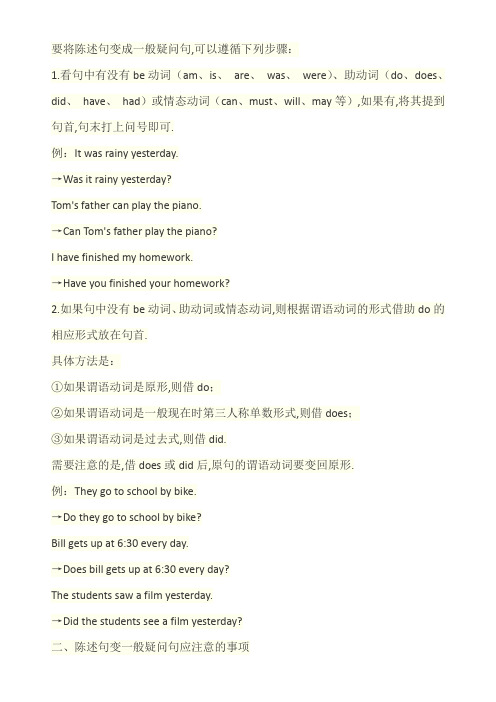
要将陈述句变成一般疑问句,可以遵循下列步骤:1.看句中有没有be动词(am、is、are、was、were)、助动词(do、does、did、have、had)或情态动词(can、must、will、may等),如果有,将其提到句首,句末打上问号即可.例:It was rainy yesterday.→Was it rainy yesterday?Tom's father can play the piano.→Can Tom's father play the piano?I have finished my homework.→Have you finished your homework?2.如果句中没有be动词、助动词或情态动词,则根据谓语动词的形式借助do的相应形式放在句首.具体方法是:①如果谓语动词是原形,则借do;②如果谓语动词是一般现在时第三人称单数形式,则借does;③如果谓语动词是过去式,则借did.需要注意的是,借does或did后,原句的谓语动词要变回原形.例:They go to school by bike.→Do they go to school by bike?Bill gets up at 6:30 every day.→Does bill gets up at 6:30 every day?The students saw a film yesterday.→Did the students see a film yesterday?二、陈述句变一般疑问句应注意的事项陈述句变成一般疑问句除了遵循上述规则以外,还应注意下列几点:1.如果陈述句中有第一人称,则变问句时最好要变为第二人称.例:I usually have lunch at school.→Do you usually have lunch at school?My father is playing soccer.→Is your father playing soccer?2.如果陈述句中有some,则变问句时往往要变成any .例:There is some water on the playground.→Is there any water on the playground?3.复合句变一般疑问句通常只变主句,从句不变.例:I know he comes from Canada.→Do you know he comes from Canada?4.如果句中含有实义动词have且表示“有”时,除借do外,也可将其直接提到句首.例:I have some friends in America.→Have you any friends in America?/Do you have any friends in America?三、总结:将陈述句改成一般疑问句的方法:三步法1、有be动词,则把be动词放在句首,剩下的照抄,(some 改成any,I改成you,my 改成your,)句点改成问号.2、有情态动词,则把can,shall,will等放到句首,剩下的照抄,(some 改成any,I 改成you,my改成your,)句点改成问号.3、没有be动词,也没有情态动词的,则将助动词Do/Does/Did放到在句首,谓语动词变回原形,剩下的照抄,(some 改成any,I改成you,my改成your,)句点改成问号.。
陈述句变疑问句和否定句
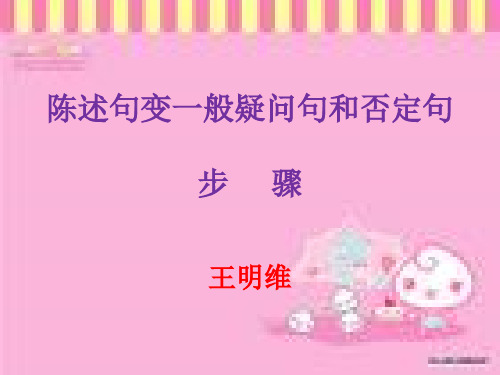
1.We always go to school on foot every day. We always don’t go to school on foot every day. 2.They went to the hospital to see their good friend, Tom. They didn’t go to the hospital to see their good friend ,Tom. 3.My good friend has two eggs and a glass of milk in the morning before he goes to school. My good friend doesn’t have two eggs or a glass of milk in the morning before he doesn’t go to school .
1.The twins are watching TV now. The twins are not(aren’t) watching TV now. 2.They were in the front of the classroom. They were not(weren’t) in the front of the classroom. 3.The child can play the piano very well. The child can not(can’t)play the piano very well. 4.We students should help each other in study . We students should not(shouldn’t) help each other in study.
如何将陈述句改成一般疑问句
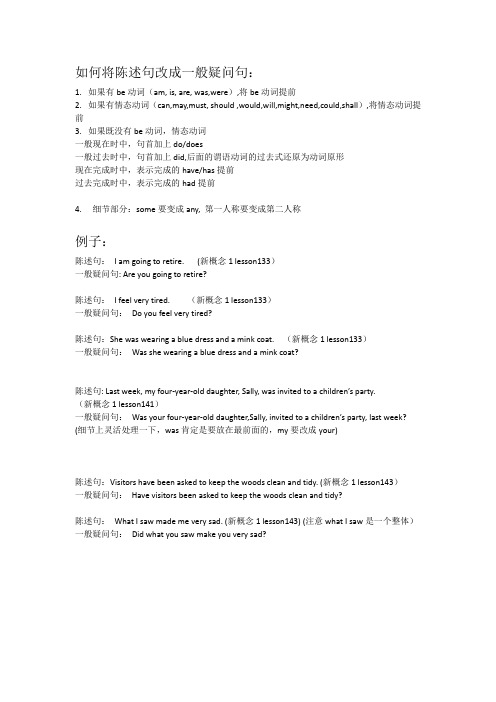
如何将陈述句改成一般疑问句:1.如果有be动词(am, is, are, was,were),将be动词提前2.如果有情态动词(can,may,must, should ,would,will,might,need,could,shall),将情态动词提前3.如果既没有be动词,情态动词一般现在时中,句首加上do/does一般过去时中,句首加上did,后面的谓语动词的过去式还原为动词原形现在完成时中,表示完成的have/has提前过去完成时中,表示完成的had提前4.细节部分:some要变成any, 第一人称要变成第二人称例子:陈述句:I am going to retire. (新概念1 lesson133)一般疑问句: Are you going to retire?陈述句:I feel very tired. (新概念1 lesson133)一般疑问句:Do you feel very tired?陈述句:She was wearing a blue dress and a mink coat. (新概念1 lesson133)一般疑问句:Was she wearing a blue dress and a mink coat?陈述句: Last week, my four-year-old daughter, Sally, was invited to a children’s party.(新概念1 lesson141)一般疑问句:Was your four-year-old daughter,Sally, invited to a children’s party, last week? (细节上灵活处理一下,was肯定是要放在最前面的,my要改成your)陈述句:Visitors have been asked to keep the woods clean and tidy. (新概念1 lesson143)一般疑问句:Have visitors been asked to keep the woods clean and tidy?陈述句:What I saw made me very sad. (新概念1 lesson143) (注意what I saw是一个整体)一般疑问句:Did what you saw make you very sad?练习:陈述句:The lady was dressed in a blue coat and a large,funny hat. (新1 lesson141)一般疑问句:陈述句:She put away her compact and smiled kindly. (新1 lesson141)一般疑问句:陈述句:The ground was covered with pieces of paper, cigarettes ends, old tires, empty bottles, and rusty tins. (新1 lesson143)一般疑问句:陈述句:Anyone who leaves litter in these woods will be prosecuted. (注意anyone who leaves litter in these woods是一个整体)(新1 lesson143)一般疑问句:。
陈述句怎样变一般疑问句
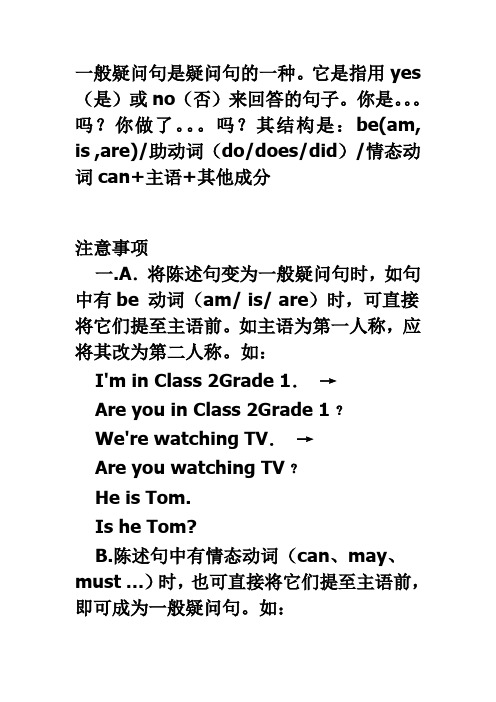
一般疑问句是疑问句的一种。
它是指用yes (是)或no(否)来回答的句子。
你是。
吗?你做了。
吗?其结构是:be(am, is ,are)/助动词(do/does/did)/情态动词can+主语+其他成分注意事项一.A.将陈述句变为一般疑问句时,如句中有be 动词(am/ is/ are)时,可直接将它们提至主语前。
如主语为第一人称,应将其改为第二人称。
如:I'm in Class 2Grade 1.→Are you in Class 2Grade 1﹖We're watching TV.→Are you watching TV﹖He is Tom.Is he Tom?B.陈述句中有情态动词(can、may、must …)时,也可直接将它们提至主语前,即可成为一般疑问句。
如:He can swim now.→Can he swim now﹖二、句子里没有be动词、助动词、情态动词(am/is/are/was/were/will/can/may/must/co uld)等,就需要加助动词do, does,(三单)、did(过去式)来构成疑问句,加上这些助动词后,句子中谓语动词必须用原形。
其句型为:Do/Does/did + 主语+ 动词原形+其它?陈述句:I like to read English.一般疑问句:Do you like to read English?陈述句:Amy speaks English. 一般疑问句:Does Amy speak English?一般疑问句,变换并不难。
先要看动词,情况分两种。
见了be(am, is , are)和can ,快快提上前。
动词为实义,do和does 上前线。
单三人称用does.动词一定要还原。
其他人称都用do.注意第一人称变第二。
原句首字母变小写,切记句号变问号。
练习1.H is father is an English teacher.2. These cats are crying.3. They can swim.4. I like to read English.5. I go to school on foot.6. He likes English.7. His father goes to work by bus.作业:变为一般疑问句1. Mrs. Li and Kitty are in a big shop.2. Kitty is wearing her new uniform.3. I can swim.4. He goes to school every day.5. I want to have a model car.6. She wants a cup of coffee.7. Mrs. Li and Kitty watch TV at night.。
陈述句改为一般疑问句
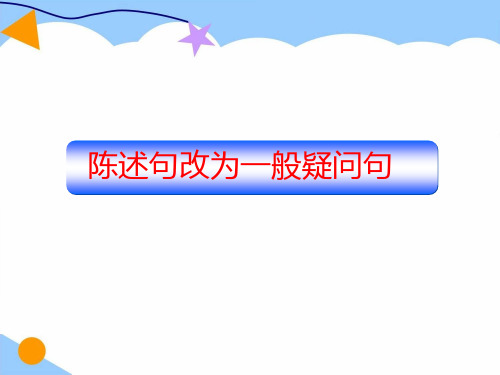
A. Do David plays football well B. Does David play football well
A. Do you have some apples B. Do you have any apples
选出下列各句的一般疑问句
4. A I can fly.
A. Can you fly B. Can I fly
5. B You can go home now.
A. Can you go home now B. Can I go home now
陈述句改为一般疑问句
一般疑问句:
能用yes / no 或相当于yes / no 回答的问句,
Do you like apples
Yes, I do. No, I don’t. Sure.
Can you swim Yes, I do. No, I
don’t.
Are you ill Yes, I am. No, I’m not.
I can swim. Can you swim
三、含实意动词的陈述句
句中没有be动词、情态动词,而有实意动词 如:eat, drink, play, like, go, have, swim等, 1.句首加上助动词Do,第一人称改为第二人称, 2. 句中有some要改为any,句号改为问号, 3.若主语是第三人称单数,Do改成Does,后面 实意动词还原成原形,
I am Mike. → Are you Mike
Mike is ten. Is Mike ten
This soup is hot. Is this soup hot
陈述句变一般疑问句
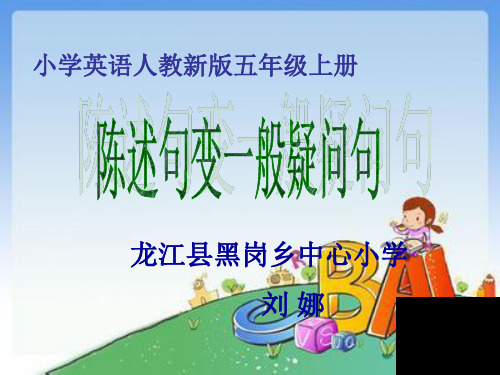
如: ①I have three books. → Do you have three books? ②Li Mei likes swimming.→ Does Li Mei like swimming?
[温馨提示] 变为一般疑问句后,朗读时可要 用升调哟!
练一练 把下列句子变成一般疑问句 1. Mike is a student. Is Mike a student? _______________________________ 2. I can clean the classroom. Can you clean the classroom? __________________________sister.→ Is this your sister? ②He can mend this bike.→ Can he mend this bike?
第二家族:含行为动词(即实义动词)的一般现 在时的句子。 [秘诀]一加二改三问号。 一加:即在句首加助动词Do(第三人称单数作 主语时加Does); 二改:句首加助动词Does之后,谓语动词必 须改为原形,句中的主语为第一人称代词时 变化同第一家族; 三问号:句末的句号改为问号。
3.We play basketball on Sundays. Do you play basketball on Sundays? ________________________________ 4. Tom likes listening to music Does Tom like listening to music? ________________________________
小学英语人教新版五年级上册
龙江县黑岗乡中心小学
刘娜
句型转换: 1、 This is my sister.(变成一般疑问句) 2、I have three books。(变成一般疑问句)
把下列句子变成一般疑问句
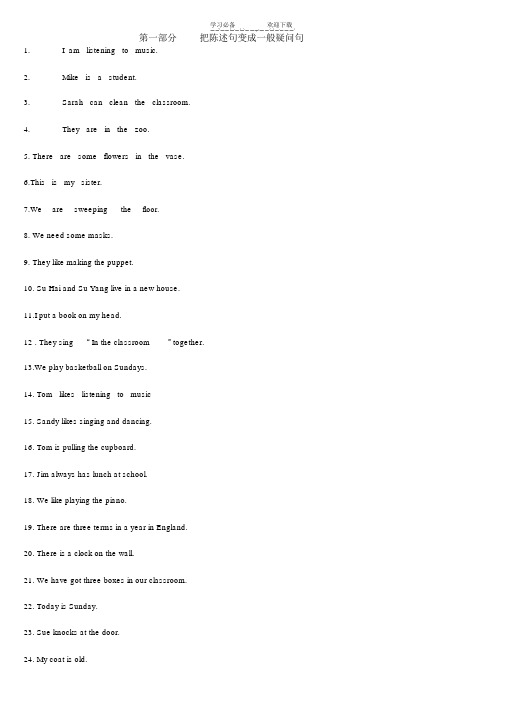
学习必备欢迎下载第一部分把陈述句变成一般疑问句1.I am listening to music._______________________________________2.Mike is a student._______________________________________3.Sarah can clean the classroom.________________________________________4.They are in the zoo.________________________________________5.There are some flowers in the vase.________________________________________6.This is my sister._________________________________________7.We are sweeping the floor.__________________________________________8.We need some masks._________________________________9.They like making the puppet._________________________________10.Su Hai and Su Yang live in a new house._________________________________________________11.I put a book on my head._________________________________________________12 . They sing“ In the classroom” together._________________________________________________13.We play basketball on Sundays._________________________________________________14.Tom likes listening to music____________________________________________15.Sandy likes singing and dancing.16.Tom is pulling the cupboard.17.Jim always has lunch at school.18.We like playing the piano.19.There are three terms in a year in England.20.There is a clock on the wall.21.We have got three boxes in our classroom.22.Today is Sunday.23.Sue knocks at the door.24.My coat is old.学习必备欢迎下载1.There are three terms in a year in England. (划线部分提问)2.There is a big study in my house. (对划线部分提问 ): d6 b2 ^& p( S# ]' h1 ?_3.There are four people in the room. (对划线部分提问 )___4.There is a clock on the wall. (用what提问)___5.The computer room is on the 2nd floor. (用 where 提问 )6.There are ten people in the library. (对划线部分提问 ); r. d3 e$ M4 U___7.There is a tall boy in the library. (用 how many 提问 ) 0 Q+ q0 N( l7 _# w. d; ]" D4 w' x5 {7 @; }0 x6 r U8.There is an office near our classroom. (对划线部分提问 )9.There are lots of animals in the forest. (对划线部分提问 )10.There are three pictures on the wall. (对划线部分提问 ),N5B#K V/ m: D( \; m! s; {11.We have got three boxes in our classroom. (对划线部分提问 )12.It ’ s May 30th对.(划线部分提问 )13.Today is Sunday. ( 对划线部分提问 )_ ___ 3 g O2 n; q$ U ~) K2 u) m% r1 C14.Our National Day is on October 1st. (对划线部分提问 )+ w( H$ m: G* \/ K V15.The children are eating pizza now.(用what提问 )0 ^]" q( l/ J' u- x16.I am having breakfast now. (对划线部分提问 ); e0 s& E; e( I, A% ^# [& ]17.Sue knocks at the door. (改成现在进行时 ) 4 o3 s4 P7 G8 |: o' R1 P' K# [" y4 t18.Tom is pulling the cupboard. (改成一般疑问句,并否定回答)___19.My mother is reading newspapers now. (用 what 提问 )! _8 p. k' v# I1 V8 P- C____# p, M7 J* Z( @/ a1 P4 L20.The boys are wearing school uniforms. (用 who 提问 )* A* ~2 v: b* B3 C7 t21.Sue ’ s grandma is having a walk in the garden. ( 用 where提问 ) % |3 V( Y3 Q2 C4 v7 U- l, _! w% a9 N9 {6 J4 S* d" ^22. Mary and Tom are listening to the music. (对划线部分提问)23.The chocolate tastes sweet. (对划线部分提问 )How# b! z, }- h! e( m0 R, [What( z+ H) d! P! D1 W' M; e. y+ P j24.These sausages smell nice. (改成单数句) _: F5 l. w0 _2 {/ B25.These sandwiches smell very nice. (改一般疑问句,并做否定回答)9J,|/G.N"V3Q__; x: O; ~- F5 u26.My coat is old. ( 对划线部分提问 ), n. s- N- u8 cHow/ L8 ?! f3 E5 J. Q" ^8 F______ 7 p- ]; y' s! z1 j% |27.Her hair is longer than yours. (对划线部分提问 )How: X' V6 r) |" G5 J- j: U* kWhat. L0 X# X1 V1 j; O* A: f R28.Tom ’ s shoes are new. ( 对划线部分提问 ) % \8 i, e0 W" q B* [1 bHow 1 A9 z6 v: m9 i; t# y- TWhat: K2 ?5 D6 q' H0 x8 n3 O29.My ball is big. ( 划线提问 )HowWhat30.The hamburger tastes delicious. (用 How 提问 )! Q j) }( _& p( sHowWhat31.These flowers smell nice. (用 how提问 )How8 ]* s3 v n* u- l6 q+ nWhat q0 q: y# ?7 Z3 f1 t: V32.Are those toys yours? (改成肯定句) 3 f: X' f( C+ ?33.These are my clothes. (对划线部分提问) _34.Those new pens are ours. (对划线部分提问 )35.It ’ s humid in spring in Hangzhou. (对划线部分提问 ) 3 b) f* T2 `$ Y! F" LHow$ w! ~- a/ Y, O# lWhat36.We can wear raincoats on the rainy days. (对划线部分提问 )37.I feel chilly in winter. (用 how 提问 )38.It ’ s a foggy day tomorrow. (用 what 、how提问 )How) b' z% `" t3 V3 X d' N' LWhat39.It ’s breezy today. ( 用 what提问 )How 4 y% [5 e2 @5 ?" V4 u% g& G( sWhat40.We are going to have a sports meeting next week. (对划线部分提问 )5 P/ L+ t% r z l3 p) p41.I ’ m going to fly a kite in the park next Sunday. (对划线部分提问)# Z3 \- K+ }+ E$ S5 G; d0 k& `# ?6 d, S42.I am going to make a paper boat this afternoon.(划线提问 )+ A, F1 R% s) S6 J8 B- K8 s+ K2 v6 L& K- e43.My mother is going to Hong Kong this weekend. (划线提问 )8 d- ?% e4 M% n2 r0 O% e+ H44.Tom is going to play video games for two hours. (划线提问 )45.They are flying the kites now. (用 tomorrow代替 now) 0 S N$ e y: ?5 `; ?! D' g y$ i( z: w4 ^4 ?46.We are going to sing karaoke this evening. (划线提问 )0 y& G; c8 s; C% w8 g: g: U, z# F3 ?7 I47.We are going to Hong Kong by plane. (对划线部分提问 )7 v# `0 t( d# a% p; l$ o3 e48.My father is going to work by bus tomorrow. (对划线部分提问 )5 j+ d. w+ v3 v! |$ a4 C) e3 b b$ W49.She goes to the park every weekend. (一般将来时 )+ x7 T. r% j4 i& x0 l9 L$ N* e* K7 D- ^! @/ }5 h4 K50.Tom is going to visit his grandparents next Friday. (改成一般疑问句,并肯定回答 )9 i1 n! n% c, i# I! C7 dK6 w% ^( }9 }51.We go to the park every Sunday. (改成一般将来时 )52.The monkey ’ s tail is for climbing the tree. (用 what 提问 )4 x) h6 Z- I8 a53.My eyes are for reading. (划线提问 ) __, q$ y b5 C( m- ^ L6 k8 ]54.We like playing the piano. (改成一般疑问句,并否定回答)55.She likes to play table tennis. (对划线部分提问 )8 K: T( X: _. W0 f8 W+ a' D3 ^( X56.Sandy likes singing and dancing. (改成一般疑问句 ), A) O% c" g* ]+ ]57.We usually have our dinner at home. (对划线部分提问). m% z- K7 f. b% T+ b- t8 c58.Jim always has lunch at school. (一般疑问句 ,并肯定回答 )59.Let ’ s climb the tree. 否(定句 )60.Please push the trolley. ( 改成否定句 )& ]1 f7 `' B9 z' \* W4B 改变句型答案Class__________ Name __________ No _______ 1 `0 R3 s% t' @) v: W; j61.There are three terms in a year in England. (划线部分提问 )___How many terms are there in a year in England?______________62.There is a big study in my house. (对划线部分提问 )____How many big studies are there in your house?_______________63.There are four people in the room. (对划线部分提问 )7 F5 |) b/ `7 w: O) ~3 i____How many people are there in the room?_____________( f ~: k# {, E5 n4 J64.There is a clock on the wall. (用what提问 )____What’ s on the wall?______________/ s: ?9 X8 K4 w: l" @* ~5 [8 K8 D& B$ D65.The computer room is on the 2nd floor. (用 where 提问 )2 F! R: a- J% W( v# Y_______Where is the computer room?___________ 3 W, f# N) ~; k6 G2 p66.There are ten people in the library. (对划线部分提问 )____How many people are there in the library?__________________& g' i/ v# m5 Q5 k/ f# q# w67.There is a tall boy in the library. (用 how many提问 )_____How many tall boys are there in the library?__________68.There is an office near our classroom. (对划线部分提问)0 f" ~: ^( O1 m( ]_____How many offices are there near our classroom?____________学习必备欢迎下载69.There are lots of animals in the forest. (对划线部分提问 )' H! j! ?7 X8 P9 B! W' A7 k_____What’ s in the forest? ____________70.There are three pictures on the wall. (对划线部分提问 )______What’ s on the wall?_________71.We have got three boxes in our classroom. (对划线部分提问 ), P7 i$ ~$ P% A: y9 z$ z: b* y0 N_____How many boxes have you got in your classroom?____72.It ’ s May 30th对.(划线部分提问 )__What’ s the date today?______73.Today is Sunday. ( 对划线部分提问 )_ _____What day is (it) today?_______74.Our National Day is on October 1st. (对划线部分提问 )6 M$ T8 U- B$ f' q4 ~! C* o_____When is our (your) National Day?________75.The children are eating pizza now.(用 what提问 ) : k/ H. n; v# F- Z! K_____What are the children doing/eating (now)?__________76.I am having breakfast now. (对划线部分提问 )___ What are you doing now?____G2 A- s# M2 o77.Sue knocks at the door. ( 改成现在进行时 )_____Sue is knocking at the door._______78.Tom is pulling the cupboard. (改成一般疑问句,并否定回答)____Is Tom pulling the cupboard? No, he isn’ t.w! I6 J5 x3 U0 K$ V$ _2 X79.My mother is reading newspapers now. (用 what 提问 )_____What is your mother doing/reading now?__________! l+ p2 ?, R+ C; X0 m- q3 o80.The boys are wearing school uniforms. (用 who提问 ) , h* t, R0 r% ?' D1 @/ q0 Y____Who is wearing school uniform(s)?________81.Sue ’ s grandma is having a walk in the garden. (用 where提问 )____Where is Sue ’ s grandma having a walk?_________82.Mary and Tom are listening to the music. (对划线部分提问 )______Who is listening to the music?___________) U! d: ^' l7 k83.The chocolate tastes sweet. (对划线部分提问 )How does the chocolate taste?_______9 b7 r. ?8 v# u! e3 GWhat is the chocolate like?_____ 1 G1 d. A) n' B$ R( {. ^84.These sausages smell nice. (改成单数句) __This sausage smells nice.___85.These sandwiches smell very nice. (改一般疑问句,并做否定回答 )9 J2 Q8 y1 ?6 T$ J4 u6 ]____Do these sandwiches smell very nice? No, they don’ t ; ~3 L0[/ Z6 p# W0 j& V86.My coat is old. ( 对划线部分提问 )$ \6 W1 ~6 a" e2 J- iHow is your coat?______ 0 |# Z2 P/ l) h: S; xWhat is your coat like?____________- R7 w- n# }2 |5 N0 ~87.Her hair is longer than yours. (对划线部分提问 )88.Tom ’ s shoes are new. ( 对划线部分提问 )How are Tom ’ s shoes?________What are Tom ’ s shoes like?____________89.My ball is big. ( 划线提问 )How is your ball?_________What is your ball like?____________" F( k, g9 `" c9 M+ g- s90.The hamburger tastes delicious. (用 How 提问 ), z- d0 `4 V8 |How does the hamburger taste? __________What is the hamburger like?________& f. P9 d% i* I9 Z5 y( n91.These flowers smell nice. (用 how 提问 )+ D$ O1 N% Z( ^9 o7 U) f# mHow do these flowers smell?_____* p) ?; e' ?& R" Q2 }What is these flowers like?________92.Are those toys yours? (改成肯定句 ) _____Those toys are yours.______93.These are my clothes. (对划线部分提问 ) ___Whose clothes are these?______94.Those new pens are ours. (对划线部分提问 ) ____Whose are those new pens?____7 r0 C- v( o% }8 d# N7 Q95.It ’ s humid in spring in Hangzhou. ( 对划线部分提问 ) 1 P2 d% q- a! Q6 ~% j) s! V% NHow is the weather in spring in Hangzhou?______What is the weather like in spring in Hangzhou?_______96.We can wear raincoats on the rainy days. (对划线部分提问 )_____When can we wear raincoats?____________97.I feel chilly in winter. ( 用 how 提问 ) _______How do you feel in winter?_______98.It ’ s a foggy day tomorrow. 用( what 、 how 提问 )How is the weather tomorrow?____What is the weather like tomorrow?____99. It’ s breezy today.用( what 提问 )How is the weather today?_______________- P6 o9 n8 A; k: G/ ]7 r( zWhat is the weather like today?___________100.We are going to have a sports meeting next week. (对划线部分提问 ) 4 Z* a/ C7 D3 @0 {_____When are you going to have a sports meeting?___________101.I ’ m going tfly a kite in the park next Sunday. (对划线部分提问 )______What are you going to do in the park next Sunday?______# {3 e6 b" S) A0 Q102.I am going to make a paper boat this afternoon.(划线提问 )________ What are you going to do this afternoon?___________7 G( j, f6 i' W- ]" Z& ]* w% I/ d103.My mother is going to Hong Kong this weekend. (划线提问 )2 Q2 E$ j+ \) }" X* J__________Where is your mother going this week?__________104.Tom is going to play video games for two hours. (划线提问 )________How long is Tom going to play video games?_____________105.They are flying the kites now. (用 tomorrow代替 now)________ They are going to fly the kites tomorrow.________________106.We are going to sing karaoke this evening. (划线提问 ); _5 S0 t( B: U3 A* y. ~# A_________When are you going to sing karaoke?__________ 4 E( m8 H6 I3 Z; {7 R107.We are going to Hong Kong by plane. (对划线部分提问 )_________How are you going to HongKong? ___________108.My father is going to work by bus tomorrow. (对划线部分提问 )_______How is your father going to work tomorrow? _______, _- U8 e/ N0 b- o# d5 ?8 m109.She goes to the park every weekend. (一般将来时 )7 k, Q+ F) u1 n- _+ ~2 s% F_______She is going to go to the park next (this) weekend.__________110.Tom is going to visit his grandparents next Friday. (改成一般疑问句,并肯定回答 )_____Is Tom going to visit his grandparents next Friday? Yes, he is._____111.We go to the park every Sunday. (改成一般将来时 )9 H) @$ F; i& D0 I# l8 _0 G" P& [__________We are going to the park next (this) Sunday. ____112.The monkey ’ s tail is for climbing the tree. (用 what提问 )_______What is the monkey ’ s tail for? ____________113.My eyes are for reading. ( 划线提问 ) ______What are your eyes for?_________114.We like playing the piano. (改成一般疑问句,并否定回答)1 V* A; ?' Z% c- y) r9 y8 E________Do you like playing the piano? No, we don’ t. 4 {; m$ c: t4 p! w0 ~6 y _115.She likes to play table tennis. (对划线部分提问 )6 b3 d. y0 Y; l# a' n__________What does she like to do?_________/ U* M W7 Q8 y8 O& {' T" g116.Sandy likes singing and dancing. (改成一般疑问句 )' O: D# ~2 `$ c+ A_________Does Sandy like singing and dancing?___________117.We usually have our dinner at home. (对划线部分提问); Y5 N2 Q% [2 v* Z, f_________ Where do you usually have your dinner? _____________118.Jim always has lunch at school. (一般疑问句 , 并肯定回答 )0 H( x6 \# {& u; a7 |0 ~7 I* L4 I" N) `______Does Jim always have lunch at school? Yes, he does.___________119.Let ’ s climb the tree. 否(定句 ) _____Let’ s not climb the tree.________ / o% m: d L; m1 `7 {9 l& e 120.Please push the trolley. (改成否定句 )_____Please don’ t push the trolley.___ ___。
陈述句改为一般疑问句和否定句
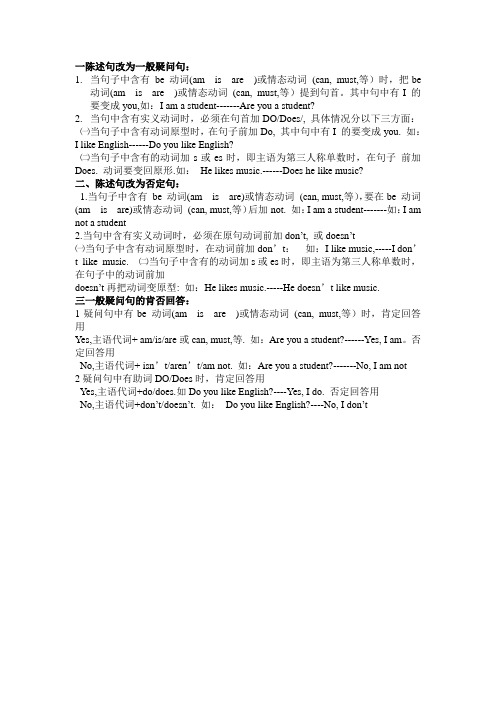
一陈述句改为一般疑问句:1.当句子中含有be 动词(am is are )或情态动词(can, must,等)时,把be动词(am is are )或情态动词(can, must,等)提到句首。
其中句中有I 的要变成you,如:I am a student-------Are you a student?2.当句中含有实义动词时,必须在句首加DO/Does/, 具体情况分以下三方面:㈠当句子中含有动词原型时,在句子前加Do, 其中句中有I 的要变成you. 如:I like English------Do you like English?㈡当句子中含有的动词加s或es时,即主语为第三人称单数时,在句子前加Does. 动词要变回原形.如:He likes music.------Does he like music?二、陈述句改为否定句:1.当句子中含有be 动词(am is are)或情态动词(can, must,等),要在be 动词(am is are)或情态动词(can, must,等)后加not. 如:I am a student-------如:I am not a student2.当句中含有实义动词时,必须在原句动词前加don’t, 或doesn’t㈠当句子中含有动词原型时,在动词前加don’t:如:I like music,-----I don’t like music. ㈡当句子中含有的动词加s或es时,即主语为第三人称单数时,在句子中的动词前加doesn’t再把动词变原型: 如:He likes music.-----He doesn’t like music.三一般疑问句的肯否回答:1疑问句中有be 动词(am is are )或情态动词(can, must,等)时,肯定回答用Yes,主语代词+ am/is/are或can, must,等. 如:Are you a student?------Yes, I am。
英语语法一般现在时的陈述句变一般疑问句
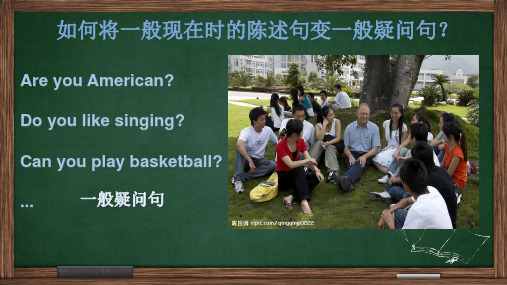
实意动词
my/our与yo加does
第一、二人称,加do
I go to school by bus.
三动词变原型
Lily gets up early everyday.
His sister often does sports . 四变问号
本身原型就不变
变问号
a student ?.
be动词提前放句首 与变后人称相一致 别忘句首字母大写
Is yMoyurpepnen is black ?.
第二步:变一般疑问句
一改人称、二放句首、三问号
情态动词 (can/may/must)
1.She can play basketball. 2.You may go home now. 3.They must do it .
They are dogs. You must go now His sister often does sports .
Be动词 (am/is/are)
单数is 复数are I跟am you跟are
情态动词 (can/may/must)
+V原
实意动词:行为动词
注意:do既可以做实意动词 又可以做助动词
第一人称与第二人称的互换
I/me与you互换 my/our与your互换
变问号
情态动词提前放句首 别忘句首字母大写
Can sShhee can play basketball ?. May YoI u may go home now ?.
第二步:变一般疑问句 一改人称
第一人称与第二人称的互换 I/me与you互换
如何将一般现在时的陈述句变一般疑问句?
Are you American? Do you like singing? Can you play basketball? ...
陈述句变一般疑问句(经典版)
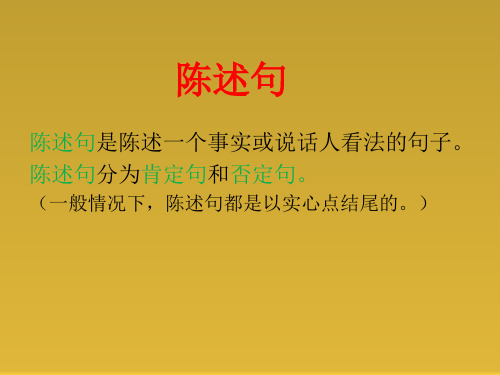
(助动词Do、Does 开头的问句)
陈述句变一般疑问句
陈述句变为一般疑问句,首先看句中有没有Be动词或情 态动词。 第一种情形:
如果有Be动词或情态动词,把Be动词或情态动词直接提到句首, 剩下内容照抄,原句中的句号变问号; 变成Be + 主语 + 其它?或情态动词 + 主语 + 动词原形 + 其它? (口诀:一提二变三抄四问。)
陈述句
陈述句是陈述一个事实或说话人看法的句子。 陈述句分为肯定句和否定句。
(一般情况下,陈述句都是3;连系动词+表语 .(主系表结构) He is a student.(他是一个学生。) • (2) 主语+谓语动词+宾语 .(主谓宾结构) I like English .(我喜欢英语。)
• (3) 主语+情态动词+动词原形+其他 . They can play football.(他们会踢足球。)
(二)否定句的主要结构
(1) 主语+Be动词+not+表语 .(主系表结构) He isn’t a student.(他不是一个学生。) • (2) 主语+情态动词+not+动词原形+其他 . They can’t play football.(他们不会踢足球。)
第二种情形:
如果没有Be动词或情态动词,要根据主语借用助动词Do 或 Does 来帮助。当主语是I、we、you、they或复数名词时,借用助 动词Do;当主语是she、he、it或单数名词时,借用助动词Does。 变成助动词Do /Does + 主语 + 动词原形 + 其它? (口诀:一看二借三抄四变五问)
陈述句改一般疑问句
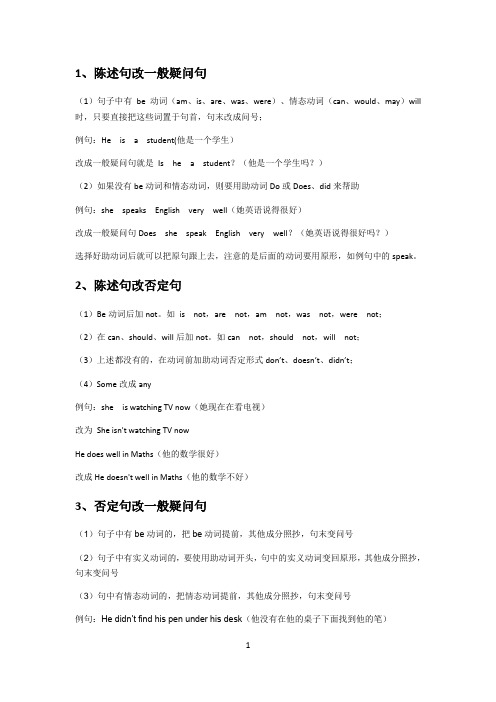
1、陈述句改一般疑问句(1)句子中有be动词(am、is、are、was、were)、情态动词(can、would、may)will 时,只要直接把这些词置于句首,句末改成问号;例句:He is a student(他是一个学生)改成一般疑问句就是Is he a student?(他是一个学生吗?)(2)如果没有be动词和情态动词,则要用助动词Do或Does、did来帮助例句:she speaks English very well(她英语说得很好)改成一般疑问句Does she speak English very well?(她英语说得很好吗?)选择好助动词后就可以把原句跟上去,注意的是后面的动词要用原形,如例句中的speak。
2、陈述句改否定句(1)Be动词后加not。
如is not,are not,am not,was not,were not;(2)在can、should、will后加not。
如can not,should not,will not;(3)上述都没有的,在动词前加助动词否定形式don’t、doesn’t、didn’t;(4)Some改成any例句:she is watching TV now(她现在在看电视)改为She isn't watching TV nowHe does well in Maths(他的数学很好)改成He doesn't well in Maths(他的数学不好)3、否定句改一般疑问句(1)句子中有be动词的,把be动词提前,其他成分照抄,句末变问号(2)句子中有实义动词的,要使用助动词开头,句中的实义动词变回原形,其他成分照抄,句末变问号(3)句中有情态动词的,把情态动词提前,其他成分照抄,句末变问号例句:He didn’t find his pen under his desk(他没有在他的桌子下面找到他的笔)改成Did he find his pen under his desk?We don’t do eye exercises every day(我们每天不做眼保健操)改成Do you do eye exercises every day?This problem can not be solved(这个问题不可以解决)改成Can this problem be solved?4、一般疑问句用否定句回答含be动词或情态动词的一般疑问句否定回答用:No,主语+be/情态动词+not例句:问句:Are these your English books?(这些是你的英语书吗?)否定回答:No,they aren’t含行为动词或实义动词的一般疑问句否定回答用“No,主语+do not/does not例句:问句:Do your parents like English?(你的父母喜欢英语吗?)否定回答:No, they don’t。
陈述句变一般疑问句课件ppt.ppt
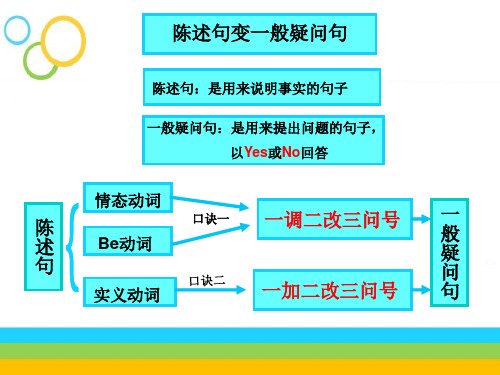
二改:改人称(第一人称改为第二人称)
I, we, my, our
you, your
三问号:句末写“ ?”
在 整 堂 课 的 教学中 ,刘教 师总是 让学生 带着问 题来学 习,而 问题的 设置具 有一定 的梯度 ,由浅 入深, 所提出 的问题 也很明 确
实义动词
“一加二改三问号”
I
like
to
sing
陈述句变一般疑问句 注意事项
肯定句 saonmye一一些些
疑问句 否定句
在 整 堂 课 的 教学中 ,刘教 师总是 让学生 带着问 题来学 习,而 问题的 设置具 有一定 的梯度 ,由浅 入深, 所提出 的问题 也很明 确
Practice 变一般疑问句
1. Her brother is a worker. Is her brother a worker ?
实义动词
一加二改三问号 句
在 整 堂 课 的 教学中 ,刘教 师总是 让学生 带着问 题来学 习,而 问题的 设置具 有一定 的梯度 ,由浅 入深, 所提出 的问题 也很明 确
口诀一 “一调二改三问号”
一调: 调情态动词或 Be 动词到句首
二改:改人称(第一人称改为第二人称)
I, we my, our
2. I had a nice trip. Did you have a nice trip ?
3. I have some money. Do you have any money ?
在 整 堂 课 的 教学中 ,刘教 师总是 让学生 带着问 题来学 习,而 问题的 设置具 有一定 的梯度 ,由浅 入深, 所提出 的问题 也很明 确
to
sing
?.
在 整 堂 课 的 教学中 ,刘教 师总是 让学生 带着问 题来学 习,而 问题的 设置具 有一定 的梯度 ,由浅 入深, 所提出 的问题 也很明 确
如何把陈述句变成一般疑问句
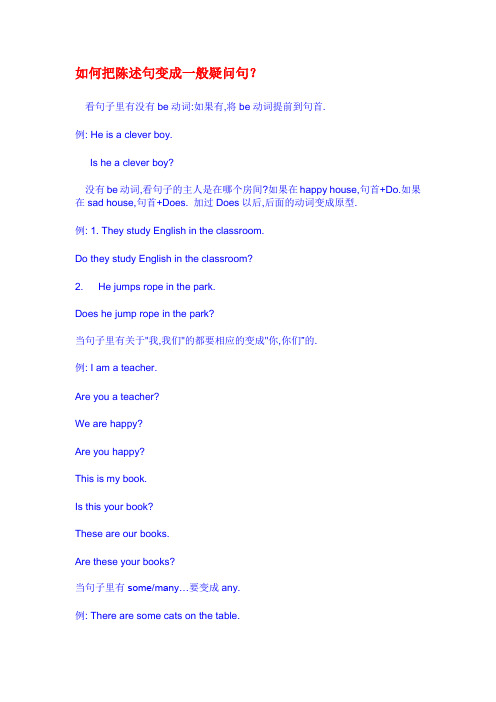
如何把陈述句变成一般疑问句?看句子里有没有be动词:如果有,将be动词提前到句首.例: He is a clever boy.Is he a clever boy?没有be动词,看句子的主人是在哪个房间?如果在happy house,句首+Do.如果在sad house,句首+Does. 加过Does以后,后面的动词变成原型.例: 1. They study English in the classroom.Do they study English in the classroom?2. He jumps rope in the park.Does he jump rope in the park?当句子里有关于"我,我们"的都要相应的变成"你,你们”的.例: I am a teacher.Are you a teacher?We are happy?Are you happy?This is my book.Is this your book?These are our books.Are these your books?当句子里有some/many…要变成any.例: There are some cats on the table.Are there any cats on the table?I have many shirts.Do you have any shirts?--------------------一、变为一般疑问句。
将陈述句变成一般疑问句,要根据陈述句中的谓语动词及其时态确定疑问形式。
其句型特点一般是:be动词或助动词或情态动词+ 主语+ 谓语+ 动词+ 其他?如:The policeman told the boys not to play football in the street. (甘肃省中考题) ______ the policeman ______ the boys not to play football in the street? 答案:Did, tell二、变为特殊疑问句。
(完整版)陈述句变成一般疑问句
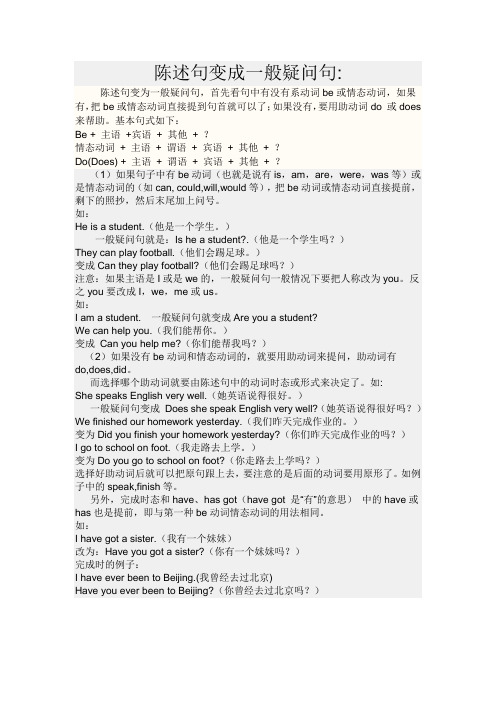
陈述句变成一般疑问句:陈述句变为一般疑问句,首先看句中有没有系动词be或情态动词,如果有,把be或情态动词直接提到句首就可以了;如果没有,要用助动词do 或does 来帮助。
基本句式如下:Be + 主语+宾语+ 其他+ ?情态动词+ 主语+ 谓语+ 宾语+ 其他+ ?Do(Does) + 主语+ 谓语+ 宾语+ 其他+ ?(1)如果句子中有be动词(也就是说有is,am,are,were,was等)或是情态动词的(如can, could,will,would等),把be动词或情态动词直接提前,剩下的照抄,然后末尾加上问号。
如:He is a student.(他是一个学生。
)一般疑问句就是:Is he a student?.(他是一个学生吗?)They can play football.(他们会踢足球。
)变成Can they play football?(他们会踢足球吗?)注意:如果主语是I或是we的,一般疑问句一般情况下要把人称改为you。
反之you要改成I,we,me或us。
如:I am a student. 一般疑问句就变成Are you a student?We can help you.(我们能帮你。
)变成Can you help me?(你们能帮我吗?)(2)如果没有be动词和情态动词的,就要用助动词来提问,助动词有do,does,did。
而选择哪个助动词就要由陈述句中的动词时态或形式来决定了。
如:She speaks English very well.(她英语说得很好。
)一般疑问句变成Does she speak English very well?(她英语说得很好吗?)We finished our homework yesterday.(我们昨天完成作业的。
)变为Did you finish your homework yesterday?(你们昨天完成作业的吗?)I go to school on foot.(我走路去上学。
陈述句变一般疑问句
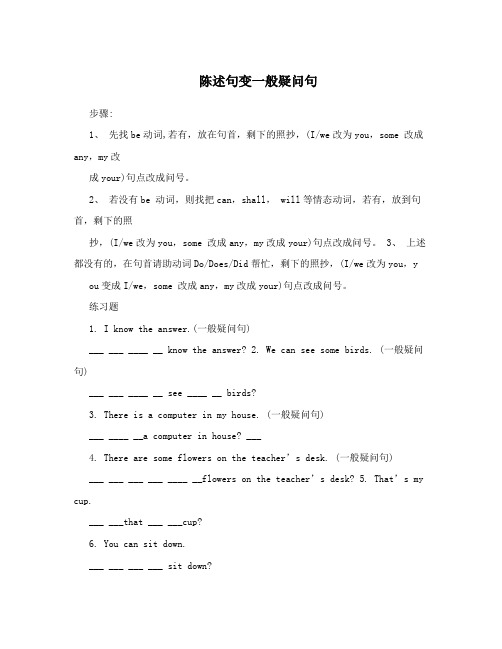
陈述句变一般疑问句步骤:1、先找be动词,若有,放在句首,剩下的照抄,(I/we改为you,some 改成any,my改成your)句点改成问号。
2、若没有be 动词,则找把can,shall, will等情态动词,若有,放到句首,剩下的照抄,(I/we改为you,some 改成any,my改成your)句点改成问号。
3、上述都没有的,在句首请助动词Do/Does/Did帮忙,剩下的照抄,(I/we改为you,y ou变成I/we,some 改成any,my改成your)句点改成问号。
练习题1. I know the answer.(一般疑问句)___ ___ ____ __ know the answer? 2. We can see some birds. (一般疑问句)___ ___ ____ __ see ____ __ birds?3. There is a computer in my house. (一般疑问句)___ ____ __a computer in house? ___4. There are some flowers on the teacher’s desk. (一般疑问句)___ ___ ___ ___ ____ __flowers on the teacher’s desk? 5. That’s my cup.___ ___that ___ ___cup?6. You can sit down.___ ___ ___ ___ sit down?7. My brother can spell his name. (改为一般疑问句)8. Jack does some work on the farm every month. (改为一般疑问句)___ ___ Jack ___ ___ ___ ___ ___ ___ on the farm every month?9. They have learned English for three years. (改为一般疑问句) ___ ___ they ___ ___ English for three years?10. His phone number is 831-4568. (一般疑问句及否定回答) --------11. This is my pen. (一般疑问句及肯定回答)--------12. I think the basketball is under the bed. (一般疑问句及否定回答) --------13. Some beautiful butterflies are in my garden. (一般疑问句及肯定回答) --------。
英语中陈述句变一般疑问句的口诀

英语中陈述句变一般疑问句的口诀在英语学习中,陈述句变一般疑问句是一个重要的语法点。
掌握这个转换规则对于正确理解和运用英语至关重要。
为了帮助大家更轻松地掌握这一知识点,下面给大家分享一个实用的口诀。
“有 be 用 be,有情用情,无 be 无情借 do/does,三单 does 加原形,其他人称用 do。
”接下来咱们详细拆解一下这个口诀。
“有 be 用be”,意思是如果陈述句中本来就有 be 动词(am/is/are/was/were),那么在变一般疑问句时,直接把 be 动词提到句首。
比如,“She is a teacher” 变成一般疑问句就是“Is she a teacher?” 再比如,“They were happy yesterday” 变成一般疑问句就是“Were they happy yesterday?”“有情用情”指的是如果陈述句中有情态动词(can/could/may/might/must/should/ought to/will/would/need等),变一般疑问句时,将情态动词提到句首。
例如,“He can swim” 变为一般疑问句就是“Can he swim?” 又如,“We should study hard” 变成一般疑问句就是“Should we study hard?”“无 be 无情借do/does”,这是说当陈述句中既没有 be 动词,也没有情态动词的时候,就要借助助动词 do/does 来帮忙。
具体用 do 还是does,取决于主语。
“三单 does 加原形”,如果主语是第三人称单数(he/she/it 或者单个的人名、事物名称等),我们就用does,并且后面的动词要变回原形。
比如,“He likes apples” 变成一般疑问句就是“Does he like apples?” 这里注意,likes 要变回 like。
“其他人称用do”,除了第三人称单数之外的其他人称(I/we/you/they 等),我们用 do 来构成一般疑问句,后面的动词用原形。
- 1、下载文档前请自行甄别文档内容的完整性,平台不提供额外的编辑、内容补充、找答案等附加服务。
- 2、"仅部分预览"的文档,不可在线预览部分如存在完整性等问题,可反馈申请退款(可完整预览的文档不适用该条件!)。
- 3、如文档侵犯您的权益,请联系客服反馈,我们会尽快为您处理(人工客服工作时间:9:00-18:30)。
陈述句变成一般疑问句:陈述句变为一般疑问句,首先看句中有没有系动词be或情态动词,如果有,把be 或情态动词直接提到句首就可以了;如果没有,要用助动词do 或does 来帮助。
基本句式如下:Be + 主语 +宾语 + 其他 + ?情态动词 + 主语 + 谓语 + 宾语 + 其他 + ?Do(Does + 主语 + 谓语 + 宾语 + 其他 + ?(1)如果句子中有be动词(也就是说有is,am,are,were,was等)或是情态动词的(如can, could,will,would等),把be动词或情态动词直接提前,剩下的照抄,然后末尾加上问号。
如:He is a student.(他是一个学生。
)一般疑问句就是:Is he a student?.(他是一个学生吗?)They can play football.(他们会踢足球。
)变成Can they play football?(他们会踢足球吗?)注意:如果主语是I或是we的,一般疑问句一般情况下要把人称改为you。
反之you要改成I,we,me或us。
如:I am a student. 一般疑问句就变成Are you a student?We can help you.(我们能帮你。
)变成 Can you help me?(你们能帮我吗?)(2)如果没有be动词和情态动词的,就要用助动词来提问,助动词有do,does,did。
而选择哪个助动词就要由陈述句中的动词时态或形式来决定了。
如:She speaks English very well.(她英语说得很好。
)一般疑问句变成 Does she speak English very well?(她英语说得很好吗?)We finished our homework yesterday.(我们昨天完成作业的。
)变为Did you finish your homework yesterday?(你们昨天完成作业的吗?)I go to school on foot.(我走路去上学。
)变为Do you go to school on foot?(你走路去上学吗?)选择好助动词后就可以把原句跟上去,要注意的是后面的动词要用原形了。
如例子中的speak,finish等。
另外,完成时态和have、has got(have got 是“有”的意思)中的have或has也是提前,即与第一种be动词情态动词的用法相同。
如:I have got a sister.(我有一个妹妹)改为:Have you got a sister?(你有一个妹妹吗?)完成时的例子:I have ever been to Beijing.(我曾经去过北京Have you ever been to Beijing?(你曾经去过北京吗?)陈述句变为一般疑问句基本上应该就这样的吧。
这可都是我自己总结的哦。
因为自己是老师,所以也就是这么教学生的。
英语怎样做否定句,一般疑问句,对划线部分提问,有怎样的技巧,举几个例子一、否定句1.主语+be动词+表语结构变否定句,直接在be动词后面加个not就可以了。
Mr. White is a very good teacher.-->Mr. White is not a very good teacher.2.主语+动词+其他当此句为一般现在时,在动词之前加don't或doesn't(第三人称单数形式),并将动词变为原形就可以了He loves playing football with his friends.-->He doesn't love playing football with his friends.当此句为过去时,在动词之前加didn't,并且把动词变为原形Tom's sister graduated from high school last year.-->Tom's sister didn't graduate from high school last year.3.主语+情态动词+动词+其他在情态动词后面加not就可以了I can drive a car.-->I cannot drive a car.4.主语+have/has+动词过去分词+其他在have/has后面加not就可以了The students have done their homework.-->The students have not done their homework.二、一般疑问句1.主语+be动词+表语结构变一般疑问句,把be动词提前,句子就变成 be动词+主语+表语结构?Mr. White is a very good teacher.-->Is Mr. White a very good teacher?2.主语+动词+其他当句子为一般现在时,在句首加do或does,并且把动词变为原形,句子变成Do/Does+主语+动词原形+其他?He loves playing football with his friends.-->Does he love playing football with his friends?句子为一般过去时,在句首加did,句子变成 Did+主语+动词+其他?Tom's sister graduated from high school last year.-->Did Tom's sister graduate from high school last year?3.主语+情态动词+动词+其他将情态动词提前,句子变成情态动词+主语+动词原形+其他?I can drive a car.-->Can you drive a car?4.主语+have/has+动词过去分词+其他将have/has提前,句子变成have/has+主语+动词过去分词+其他The students have done their homework.-->Have the students done their homework?三、对划线部分提问先找出划线部分在句子中所占得成分,找到对应的疑问词,将疑问词写在句首,再将原句变成一般疑问句,却掉划线的部分,写在疑问词后面就可以了。
Tom bought a new computer from the store yesterday.若划线部分为Tom,Tom 是个人,且作主语,则疑问词应选Who,此句应该为Who bought a new computer from the store yesterday?若划线部分为a new computer,划线部分为物,则疑问词为what,此句应为What did Tom buy from the store yesterday?若划线部分为from the store,则疑问词应为Where,表示地点,此句应为 Where did Tom buy a new computer yesterday?若划线部分为yesterday,则疑问词为When,表示时间,此句应为 When did Tom buy a new computer from the store?英语怎样变句型一般疑问句否定句反问句肯定句画线提问0分1. 由连系am,is,are构成的句子:变一般疑问句时把am,is,are提到句子的前面,句尾用问号即可。
变否定句时直接在am,is,are后面加not即可。
例如:肯定句:He is a student.一般疑问句: Is he a student?否定句: He is not a student.反问句: He is a student, isn't he?He isn't a student, is he?画线提问: 对he提问: Who is a student?对 a student 提问: What is he? or What does he do?2. 由情态动词can, may, should等构成的句子: 变一般疑问句时把can,may,提到句子的前面,句尾用问号即可.变否定句时直接在can,may,后面加not即可. 例如:肯定句: She can swim.一般疑问句: Can she swim?否定句: She can not swim.反问句: She can swim, can't she?She can not swim, can she?画线提问: 对she提问: Who can swim?对swim提问: What can she do?3. 由行为动词构成的句子: 需要加助词do或does. 变一般疑问句时把do/does放在句子前面. 例如:肯定句: They play football after school.一般疑问句: Do they play football after school?否定句: They don't (do not play football after school.反问句: They play football after school, don't they?They don't play football after school, do they?画线提问: 对they提问: Who play football after school?对play football提问: What do they do after school?对after school提问: When do they play football?小学英语语法提高/一般疑问句和特殊疑问句疑问句可再分为一般疑问(General question)和特殊疑问(Special question)两种。
1.一般疑问:用be或助动词或情态动词置于句首,并以“Yes,…”,或“No,…”或相当于yes / no回答的问句称为一般疑问句.2. 含系动词be的一般疑问句的构成具体地说,am 只能跟在第一人称的单数 I 后面,are 搭配 you, 不管是单数还是复数,is 跟在第三人称单数 he, she 后面,be 动词的基本意思:是如:I'm in Class 2, Grade 1. →Are you in Class 2, Grade 1? 你是在一年级二班吗?(如遇第一人称,最好将其置换成第二人称It's a map of China. →Is it a map of China? 这是一幅中国地图吗?be 或 have(有)置于句首来表达疑问,例:Am I wrong again? (我又错了?)Yes, you are (wrong again). (是的,你又错了。
